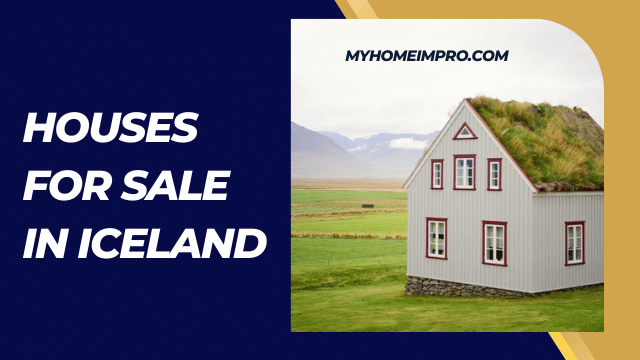How does one buy property in Iceland? Can foreigners purchase real estate in Iceland? What are the national average home prices, and are there any laws that could make purchasing a home more dangerous? Continue reading to learn everything there is to know about buying real estate in Iceland.
Introduction to Iceland’s Real Estate Market
Table of Contents
Many foreign visitors start dreaming of staying in Iceland for much longer than just their vacation as the place continues to captivate their minds.
Some would even consider whether they could live on the island permanently, taking it a step further. Considering how charming Icelandic society typically is, this dream shouldn’t be that surprising.
Think about the excellent healthcare and education systems, the amazing natural settings, the welcoming locals, and the low crime rate. People are drawn to the nation by all of these factors and more, and many of them want to deepen their relationship with it.
Possibly the biggest commitment one can make to this little island is buying real estate in Iceland. The Icelandic housing market offers constantly shifting options, regardless of the purpose of the purchase: either to build a permanent abode or to rent out to international guests or local Icelanders.
Purchasing Property as a Foreigner in Iceland
When it comes to the countries from which tourists to Iceland are coming, Americans make up the majority (27%), followed by visitors from the UK (16%), Germany (7%), Canada (5%), France (4.6%), and China (4%).
These numbers represent Icelandic real estate buyers, with Americans leading the way in terms of interest in buying. The overwhelming number of Icelanders who choose to buy a second house in their home country while they are abroad is especially noteworthy. There is little doubt that since Iceland’s economy recovered from the 2008–2011 financial crisis, the number of people buying second properties has increased.
A general regulation that pertains to foreign and potential property owners in Iceland is the requirement to obtain authorization from the Ministry of Justice. The ministry handles several different aspects of civic engagement, including as elections, policing, immigration, and human rights.
According to the Housing Financing Fund, EEA nationals with a valid Icelandic address are entitled to buy real estate just like any other citizen. You have to apply to the Icelandic Directorate of Immigration in order to obtain a residency permit.
It is still feasible to buy a home in Iceland even if you don’t plan to live there, provided you get special approval from the Ministry of Justice.
It is strongly advised, therefore, that a potential buyer spend some time in Iceland in order to familiarize themselves with the Icelandic real estate market. They will have many of chances to learn about the ins and outs of the trade during this period.
Real Estate Prices in Iceland
The average cost of a house and the rate of inflation varies greatly between the areas of Iceland. Firstly, this involves monitoring the demographic shifts in each location. However, considering the market’s flexibility, any potential buyer should be aware that these rates are still subject to change for four main reasons.
Real estate market dynamics are primarily driven by four factors: interest rates, demographics, government subsidies, and state of the economy. Before proceeding with a suggested investment, prospective buyers ought to take all of these into account.
Among these is the present pattern of skyrocketing pricing, which is being driven by Iceland’s constant flood of tourists. The residential property price index for the entire nation nearly quadrupled in 2017 alone, rising from 8.06% to a staggering 23.15% from the previous year.
As one might anticipate, real estate in Iceland’s capital, Reykjavík, is more costly than that in smaller towns. In Iceland, the cost of a single-unit dwelling rose by 2.37% in 2019, and the cost of a multi-unit building was slightly less than 3.47%. In the capital right now, the average price of a residential property ranges from 40 million ISK (US$ 382,500) to 50 million ISK (US$ 478,130).
Hafnarfjördur and Mosfellsbaer are the most affordable areas of the city to buy real estate in; they are both located on the periphery. The little amount of property closer to downtown means that these sites follow the predicted trend. It has been evident in recent years that city construction cannot keep up with the rate of demand.
Due to its proximity to many services such as an airport, hospital, and college, as well as its larger population of approximately 2,350, Egilsstaðir is the most expensive town in East Iceland to buy property in.
The sparsely populated Westfjords are the least expensive place in the nation to buy real estate. In an effort to increase the population of the Westfjords, the local municipality has even been known to give away real estate properties for free in the past.
Why Buy Property in Iceland?
Iceland’s Attraction for Residency
• Reputation for stunning scenery, forward-thinking, English-speaking population, and creative culture.
• Despite its natural beauty, Iceland lacks urban development, despite its small population of 350,000.
• Investment in Iceland’s future is a significant reason to purchase property.
• Iceland’s international influence has increased, attracting foreign investment.
• Despite construction issues, Iceland’s urban development is still in its early stages due to new funding.
Building Property in Iceland
It’s not unusual to learn from local Icelanders that one of their ancestors built their family’s dwellings in the past. This kind of building has helped to create the distinctive architecture of this island; numerous examples show how the Icelandic people have a wonderful way of blending their houses in with the landscape.
Naturally, throughout time, this do-it-yourself method of building houses has become much more regulated. For individuals who want to start their path with nothing more than an empty lot, some designs, and a head full of ideas, there are still plenty of opportunities accessible.
A construction permit from the local municipality’s inspector is required in order to construct, rebuild, or make alterations to a property that include expansions. Before granting a permit, the building inspector will speak with various committees to make sure the renovation complies with all construction laws.
Because each of Iceland’s national parks—Vatnajökull, Snaefellsnes, and Þingvellir—needs to protect its unique natural environment, building property adjacent to any of these parks is forbidden.
Real Estate Agents in Iceland
If solely for their insider knowledge and purchasing prospects, a local, English-speaking real estate agent will probably be required for anyone trying to buy property in Iceland. Still, there are additional expenses involved.
The commission for a real estate agent can range from 1.5% to 2.4% of the total price of the property. In addition, 2000 ISK is the stamp duty rate for property transfers, plus 0.8% of the official property value. Lastly, 0.1% of the property’s worth will go toward the cost of registration.

